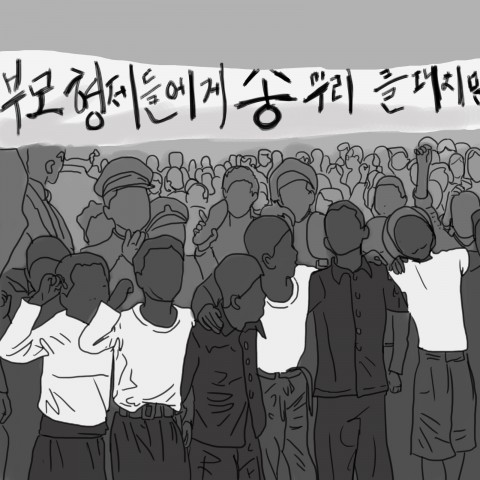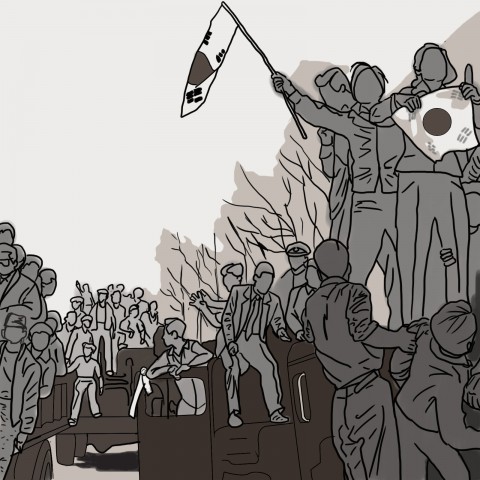Do you know what political events happened in Korea after the Korean War ended? Although there was a lot of economic development, there was also a period of dictatorship. There were also various democratic groups that resisted the dictatorship.
In this lesson, you’ll learn about the civil Korea Revolution on April 19th that rose against the corrupt political power in the 1960s. As you’ll see, for Korea, 1960 was a year of great significance.
One of Korea’s most significant events, the Korean 1960 Revolution on April 19 is a vital piece of knowledge in your Korean learning journey. It will both open your eyes to Korea’s vast history and allow you to better understand its modern culture. So let’s get started!
1. Reading Practice: What is April 19th Revolution Day in Korea?
So, what is April 19 Revolution Day in Korea? Read the Korean text below to find out (and you can find the English translation directly below it).
—
한국전쟁이 일어난 다음 한국에서는 이승만 대통령 정권이 시작됩니다. 하지만 한국전쟁 이후 이승만 대통령은 12년간 장기집권을 하게 되고, 독재 정권 아래서 여러가지 부정부패 문제가 일어나게 되었는데요. 결국 1960년 3월에 있었던 재선을 위한 선거과정에서 선거개표를 조작하였고, 이 사실이 세상에 알려지게 됩니다.
그 전부터 독재정치에 불만을 가졌던 사람들이 이 부정선거를 계기로 여기저기서 시위를 하기 시작합니다.
1960년 4월 초, 부정선거 사실이 알려진 뒤 가장 먼저 마산에서 시위가 일어났습니다. 하지만 당시 정부는 경찰과 폭력배를 시켜서 시위대를 무자비하게 진압하게 됩니다. 이러한 폭력적인 대처에 화가 난 시민들은 결국 전국 각지에서 시위를 하게 되는데요. 서울에서는 고려대학교 학생들을 중심으로 4천여명의 학생들이 모여서 국회의사당까지 걸어가며 시위를 하게 됩니다. 하지만 평화적으로 이루어졌던 시위를 끝내고 학교로 돌아던 학생들이 폭력배들에게 맞아서 큰 부상을 당하게 되면서 국민들의 불만은 최고조에 달합니다.
시민들과 학생들은 결국 ‘이승만 하야와 독재정권 타도’라는 구호를 외치며 더욱 큰 시위를 열게 됩니다. 이 시위를 진압하는 과정에서 또 다시 수많은 사람들이 다쳤음에도 시민들은 끝까지 자신들의 뜻을 굽히지 않았습니다. 그리고 4월 19일에 대규모 시위가 일어나게 됩니다.
이날 이후 결국 이승만대통령은 한국을 떠나 하와이로 망명을 가게 되었습니다. 시민들의 힘으로 독재정치를 내보낸 419 혁명은 한국 현대역사의 첫 민주주의 혁명으로 기록되고 있습니다.
—
After the Korean War broke out, Ri Seungman began his rule as president. After the war, he was in power for twelve years, and there was a lot of corruption under his dictatorship.
Finally, in the reelection of March 1960, the fact that the votes were being controlled became known to the world.
People who had complaints about the dictatorship prior to that started holding demonstrations here and there.
After the election fraud became known at the beginning of April 1960, the first demonstration occurred in Masan city. But the government ordered police and organized crime groups to mercilessly suppress the demonstrations. Citizens, angered by this rather violent way of handling the demonstrations, started demonstrating all over the country. In Seoul, a group of about 4,000 students, mostly from Korea University, began protesting in front of the National Assembly Building. The students finished the protest peacefully and returned to school, where they were beaten by organized crime groups. This was the peak of the citizens’ dissatisfaction. Students and citizens began protesting more while yelling, “Resign Ri Seungman and Overthrow the Dictatorship!” College professor groups and scholars alike gathered and demanded Ri Seungman’s resignation. Despite the method of suppressing the protests and how many people were injured, their will didn’t falter. And so, on April 19th, they had a large-scale protest.
After that day, Ri Seungman left Korea and was exiled to Hawaii. 419 Revolution Day, when the dictatorship was overthrown by the people’s power, was the first democratic revolution recorded in recent Korean history.
2. When is the April Revolution of Korea Celebrated?
Each year, Koreans celebrate April 19th Revolution Day on—you guessed it—April 19 on the solar calendar, in commemoration of April 19, 1960.
3. How is the Korea 1960 Revolution Celebrated?
On April 19th, many people visit the 419 National Cemetery to honor the people who struggled for democracy.
There’s a 419 revolution memorial tower inside the cemetery. On 419 Revolution Day, people visit that tower and remember the people who were hurt and gave their lives for democracy leading up to the April 19, 1960 Korean Revolution.
4. Additional Information: More Special Days
419 Revolution Day is on April 19th of the solar calendar. In addition to 419 Revolution Day, there are a few other special days with their date in the name. Do you know which days those are?
Like 419 Revolution Day, there are a few other days with their date in the name. There’s the day marking the start of the Korean War on June 25th, which is called “625.” There’s also the pro-democratic resistance day on May 18th, called 518 Revolution Day.
5. Must-know Vocab
Here’s some vocabulary you should know for April 19th Revolution Day in Korea!
- 학생 (haksaeng) — “student”
- 교수 (gyosu) — “professor”
- 피해자 (pihaeja) — “victim”
- 민주주의 (minjujuui) — “democracy”
- 시위 (siwi) — “demonstration”
- 시민 (simin) — “citizen”
- 분노 (bunno) — “anger”
- 이승만 정권 (iseungman jeonggwon) — “Syngman Rhee government”
- 혁명 (hyeongmyeong) — “revolution”
- 하야 (haya) — “resignation”
- 대통령 (daetongnyeong) — “president”
- 국가 유공자 (gukga yugongja) — “men of national merit”
- 독재정권 (dokjaejeonggwon) — “dictatorial government“
- 4.19 혁명 (sailgu hyeongmyeong) — “19th April of Bastille Day”
- 불법 (bulbeop) — “illegality”
To hear each of these words pronounced, visit our 419 Revolution vocabulary list. Here, you’ll find each word accompanied by an audio of its pronunciation.
Conclusion
As you can see, April 19 Revolution Day in Korea is a significant holiday that commemorates a pivotal time frame in Korea’s history. We hope you enjoyed learning about the 1960 Korean student revolution and its commemoration with us!
Is there a Revolution Day in your own country? How is it celebrated? Let us know in the comments!
For even more information on Korean culture and the Korean language, visit us at KoreanClass101.com and set up your account today! We offer an array of insightful blog posts, free vocabulary lists, and an online community to discuss lessons with fellow Korean learners. With a Premium Plus account, you can also take advantage of our MyTeacher program, and learn Korean one-on-one with your own personal Korean teacher.
Learning a new language can be a staggering task, but it’s completely worthwhile. Know that your hard work and determination will pay off, and one day you’ll speaking, reading, and writing Korean like a native! We wish you the best in your language-learning journey!












